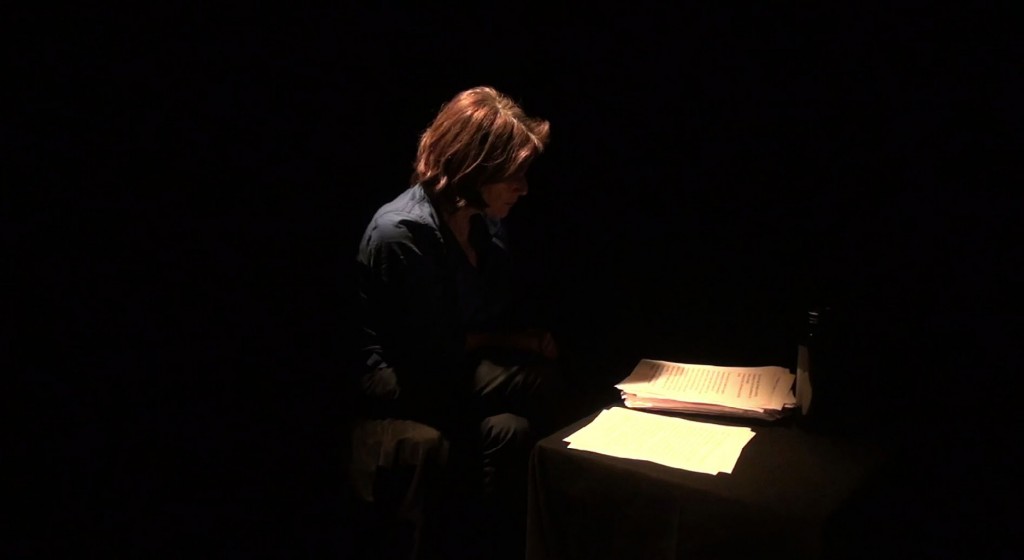Chantal Akerman
STANZE
Sul custodire e il perdere
A cura di Rita Selvaggio
Inaugurazione: 26 febbraio 2022, ore 18:30

Chantal Akerman, My Mother Laughs Prelude, still da video (2012)
Courtesy of Chantal Akerman Foundation and Marian Goodman Gallery
Casa Masaccio | Centro per l’Arte Contemporanea è lieta di presentare il secondo appuntamento di ESPORRE IL CINEMA, un ciclo di mostre legate annualmente al Premio Marco Melani che, per l’edizione del 2021, è stato consegnato alla memoria di Chantal Akerman (Bruxelles, 1950 – Parigi, 2015). Chantal Akerman, regista, artista, attrice, scrittrice e sceneggiatrice, è una dei più importanti registi della sua generazione. Figura di punta nel cinema europeo sperimentale, sin dai primi anni 70 ha avuto un ruolo cruciale nella graduale dissoluzione, così emblematica negli ultimi vent’anni, delle frontiere tra lo spazio del cinema e quello dell’arte. E’ dal 1995 che, spesso ma non sempre, incomincia ad usare i suoi lungometraggi come punto di partenza nel processo di una riconfigurazione spazio-temporale.
Figlia di Ebrei polacchi sopravvissuti ad Auschwitz e rifugiati in Belgio, sin dai suoi precoci esordi, Akerman ha sempre avuto un’ossessione per lo spazio domestico come da sempre ha anche perseguito un senso di “appartenenza” , anche se spesso dichiarava di non appartenere a nessun luogo. La sua mappa affettiva ha sempre comportato una tensione tra evocazione astratta e quotidianità concreta e la casa ha costituito un focus centrale all’interno della sua pratica. Concetto ancestrale e modernissimo che, in molti dei suoi film, diventa un teatro di solitudine per eccellenza. STANZE. Sul custodire e il perdere, prende voce e corpo in uno storico edificio patrimoniale, la cui originaria destinazione d’uso era proprio quella domestica, e interagisce con la natura non standardizzata dello spazio già di per sé narrativo. Assecondando la sua politica espositiva e culturale, anche in questa occasione Casa Masaccio insiste sull’idea di una contiguità semantica tra il percorso espositivo e il contesto architettonico con una mostra che asseconda le potenzialità del cinema come spazio tridimensionale e come esperienza spaziale oltre che temporale. Le stanze, luoghi fisici densi di significati metaforici, sono tanto tratti semantici dell’abitare quanto spazi interiori e unità metriche della poesia.
Il percorso espositivo, rendendo il visitatore partecipe della dinamica e del movimento delle immagini, si articola tra senso di appartenenza e sentimento di perdita, soglie e confini, tra interiorità e esteriorità. A introdurre la mostra, Marcher à coté de ses lacets dans un frigidaire vide (2004), installazione sonora che implica l’idea dell’attraversamento di un labirinto trasparente alla ricerca di un taccuino scritto in polacco nel 1920 e appartenuto alla madre della madre dell’artista. Unica cosa di lei rimasta, non molto e allo stesso tempo un intero mondo. Sono inoltre in mostra, My Mother Laughs Prelude (2012), Femmes d’Anvers en Novembre (2008), un’installazione video a canali multipli in cui il racconto di geografie femminili che respirano all’unisono e il gesto ripetitivo della donna che fuma si riconnettono alla ritualità del quotidiano di Jeanne Dielman (1975), il film con cui Akerman si è imposta all’attenzione della critica. Dai suoni urbani e dalle mutevoli immagini, prive di ogni narrativa, di Tombée de Nuit sur Shanghai (2007): porti, acqua, navi, passanti casuali, le enormi insegne pubblicitarie come anche la linea dell’orizzonte di Shanghai e la notte che in tempo reale cala sulla città, a La Chambre (1972-2007). Qui, Akerman, regista e al contempo attrice silenziosa, indaga la realtà moltiplicando lo spazio domestico. Il luogo dell’indagine estetica e concettuale sul tempo che passa è l’interno di una stanza che si dilata attraverso il movimento ipnotico e circolare della ripresa.
Sul custodire e il perdere, allude a quell’indistruttibile che resta e resiste ad ogni corrosione, ma anche al processo stesso di editing richiesto dal montaggio, vero atto cruciale di un film.
Chantal Akerman (Bruxelles, 6 giugno 1950 – Parigi, 5 ottobre 2015) è stata una regista, sceneggiatrice e artista belga, pioniera del cinema femminista ed è considerata oggi tra i più importanti registi della sua generazione. Nata a Bruxelles da genitori polacchi sopravvissuti al trauma dell’olocausto, un tema ricorrente nella sua opera, Akerman raggiunse l’apice del successo come regista di avanguardia durante gli anni Settanta grazie a “Jeanne Dielman, 23, quai du commerce, 1080 Bruxelles”, uscito nel 1975 e ancora oggi considerato come uno dei capolavori della storia del cinema. Regista di oltre 40 film, Akerman fu una delle prime personalità a sperimentare le opportunità che il cinema poteva offrire alle arti visive, sotto forma di installazioni. Recentemente, Eye Filmmuseum di Amsterdam le ha dedidato “Passages”, ampia mostra personale curata da Jaap Guildemond. Personali importanti delle opere di Akerman si sono tenute al ICA di Londra (2014-2015), al Museo d’Arte Contemporanea di Antwerp in Belgio (2012), al MIT di Cambridge, Massachusetts (2008), al Museo d’Arte di Tel Aviv in Israele (2006), al Museo dell’Arte dell’Università di Princeton nel New Jersey (2006) e al Centro Georges Pompidou di Parigi (2003). Akerman ha partecipato a “Documenta XI” (2002) e alla Biennale di Venezia (2001, 2015). Nel 2011 una retrospettiva dei suoi film si è tenuta al Vienna Film Festival. Si è appena conclusa “From the other side” presso Marian Goodman Gallery, sede di Parigi.
STANZE. Sul custodire e il perdere è stata ideata sotto la direzione artistica di Claire Atherton, stretta collaboratrice e editor di Akerman, rappresentante della Fondazione Chantal Akerman, e con Carole Billy, direttore associato della Galleria Marian Goodman di Parigi.
Un grazie speciale a: Mus.e musei // eventi firenze (Firenze); Christophe Leunis e Nina Doevendans (Vertigo Creative Studio, Antwerpen); Fabrizio Barbieri, Simone Mancini, Corrado Meloni, Daniele Romano (FD Events
s.r.l., Firenze).

